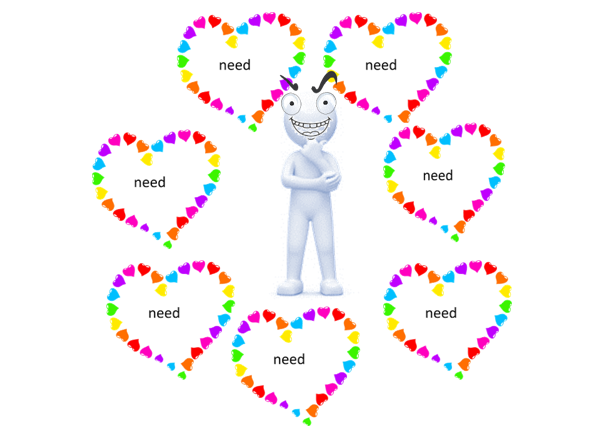13. The Theory of the False Self
We have our doubts. Why? Because we very often meet people who do not have good access to their own needs. And that immediately raises another question:
How can a person who does not have good access to his or her own needs have good access to the needs of other people?
Or put another way:
How can someone who has little empathy for themselves be able to have empathy and understanding for other people?
At this point we have to refer to another theory. It comes from the psychoanalyst Donald Winnicott. It is about the False Self (p. 140-152).
This theory says: The False Self is a defensive façade behind which a person can feel hollow and empty because his or her behaviours are learned and controlled rather than spontaneous and genuine. A False Self often develops at a very early age. (cf. Winnicott 1960, pp. 140-152)
Children who have many parts of a False Self are handicapped in their individual development. They have to perform, adapt and function a lot. As a result, they also cannot really find out who they are themselves. And they do not get their wishes for affection unconditionally answered.
When many different areas of life are affected by false self-parts a lot of frustration and also anger builds up in these children. However, this frustration and anger often remain hidden behind the false self-parts. Persons with many false self-parts lose more and more access to their own needs and eventually their own needs are even split off. As a result of this dissociation, these individuals have no access to their own feelings and, which makes things even more worrying, they increasingly deny these feelings to others. They have developed little empathy for themselves and thus cannot muster it for others either.
This is a challenge for parents, there is no question about that! At this point, however, we must not disregard the school and its framework conditions, because this is also about pressure to perform (having to achieve a lot and function). We have to ask ourselves how school itself can be a place where personal growth is promoted and young people can develop as freely as possible?
Why is this important? What does all this have to do with democracy?
Let us return to the basic needs as formulated by William Glasser and relate them to Donald Winnicott's theory of the False Self.
A True Self - the counterpart to a False Self - is a person who has good access to his or her own needs. A person who can empathise with himself or herself is more likely to be able to empathise with others.
 Figure 13: True Self
Figure 13: True Self
A person with a False Self does not have good access to his or her own needs. Because he or she has little access to his or her own needs, he or she can also have little empathy for other people.
 Figure 14: False Self
Figure 14: False Self
The more False Self parts a person has, the more likely he or she is also in danger of not behaving cooperatively and responsibly because he or she lacks empathy for himself or herself and for others.